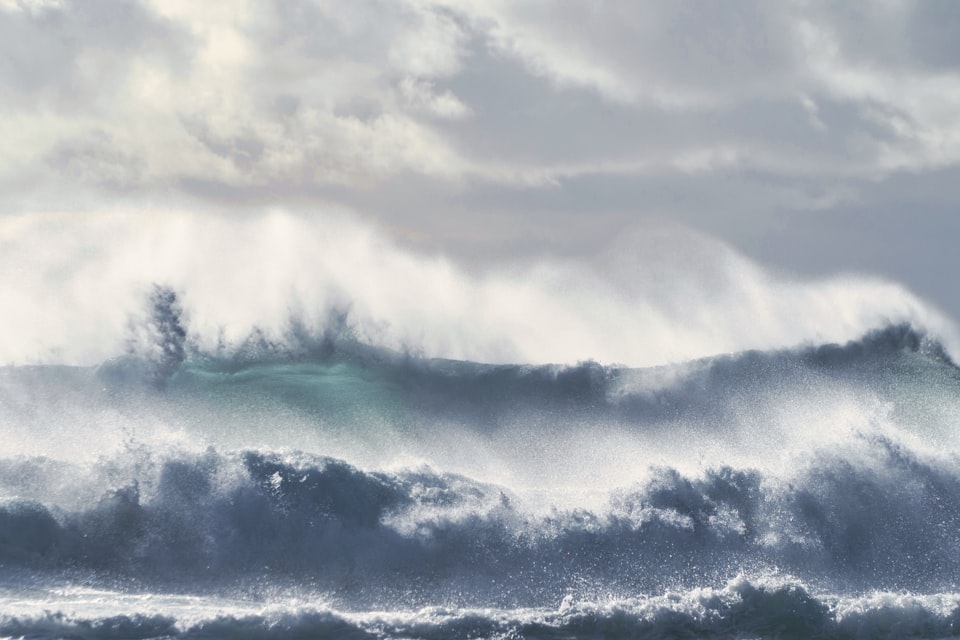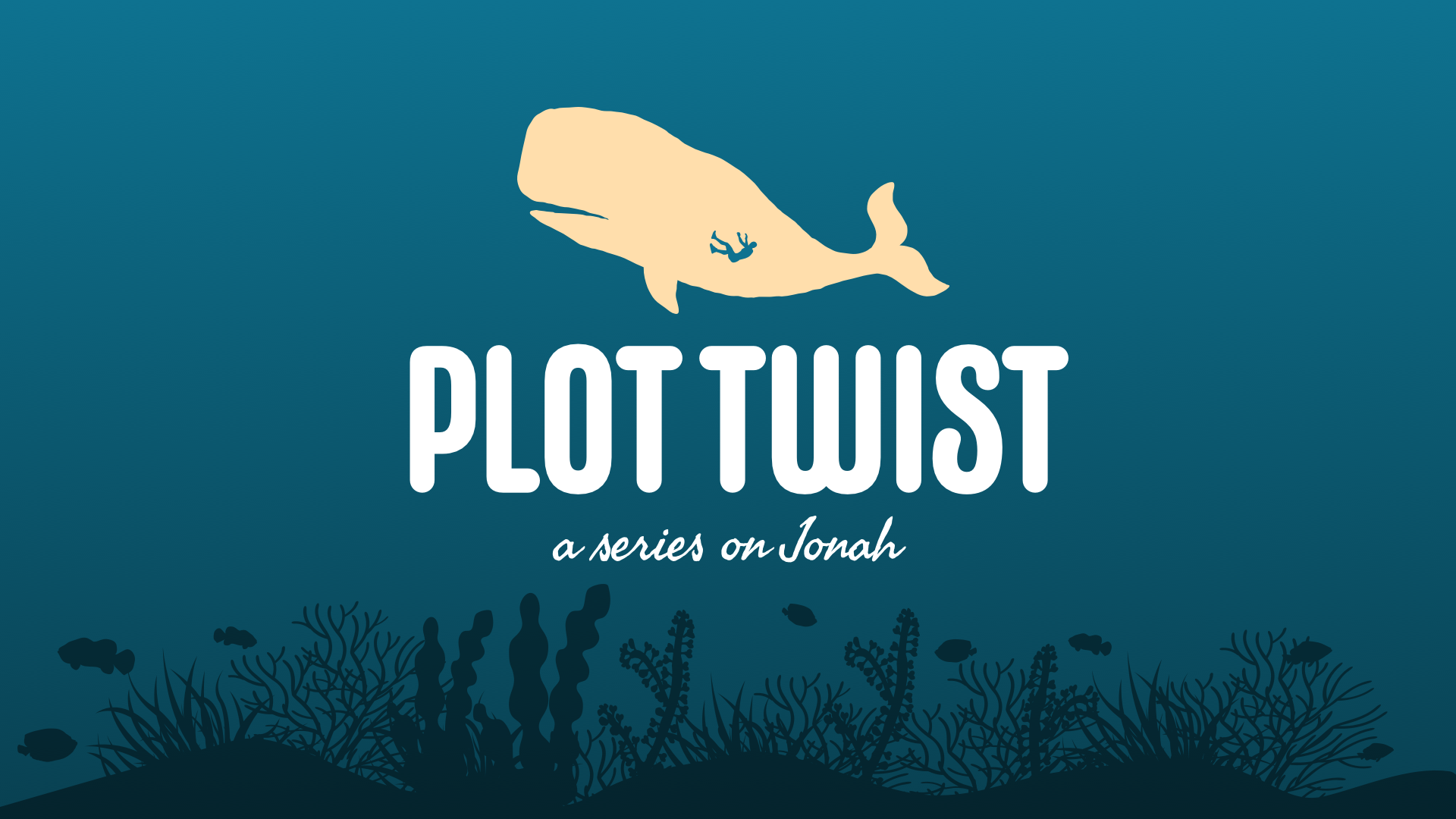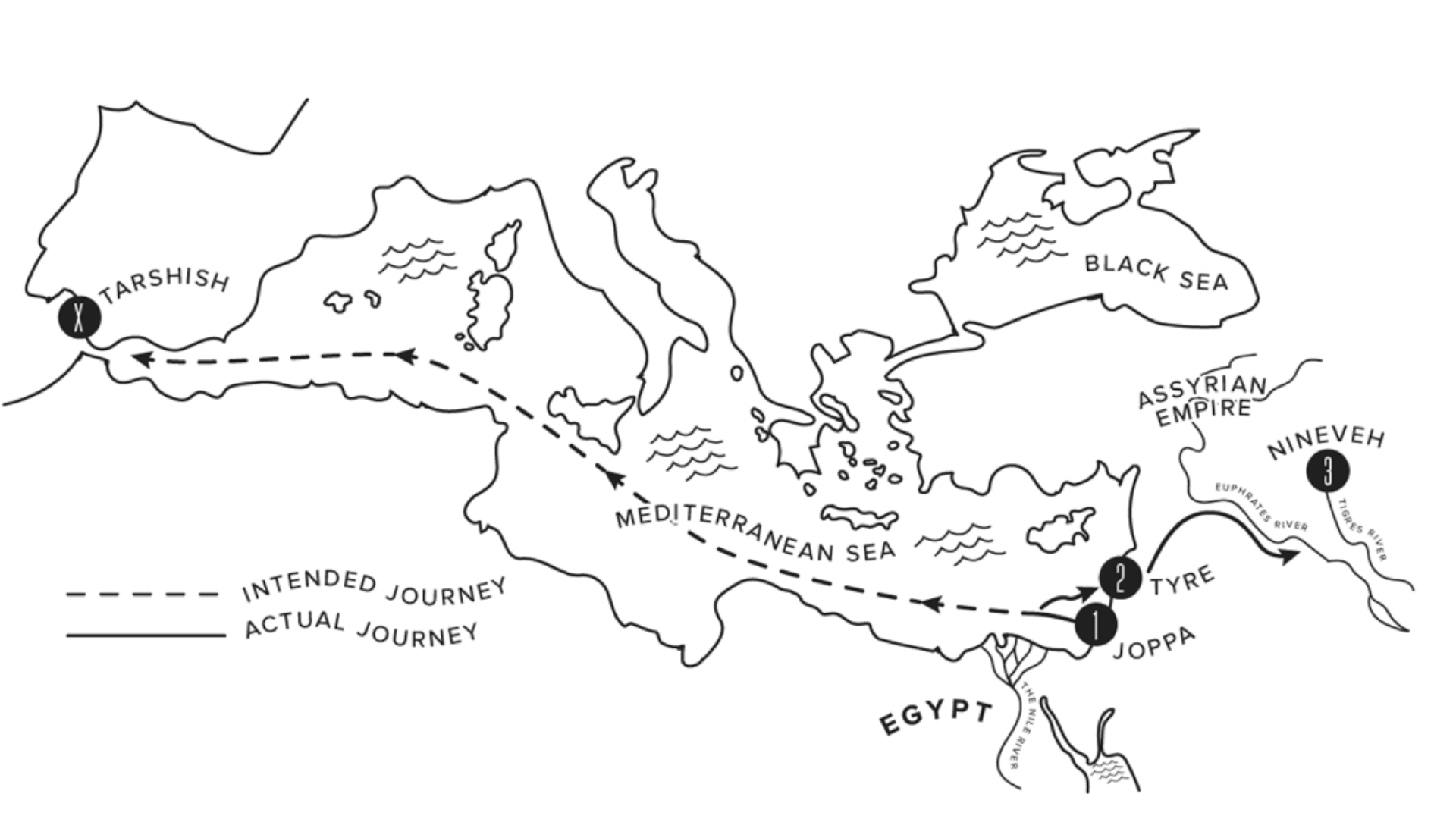Plot Twist 1: God is Still at Work

Sermon Delivered at The Local Church
June 12, 2022 • Trinity Sunday
Scripture: Jonah 1:1–17
What book, tv show, or movie has the most memorable plot twist for you?
On our TLC+ online community, Susan said, The Sixth Sense. Richard said, The Third Man. What comes to mind for you?
For me, one of the biggest has to be the final episode of Season 1 of 24. The first season of The Good Place had quite a plot twist, too, didn’t it? And, of course, there’s also the classic reveal in the original Star Wars trilogy when Luke is engaged in battle with Darth Vader, convinced that Darth Vader killed his father when all of a sudden, Darth Vader comes in with, “No, I am your father.”
My favorite plot twist of the last few years has to be from the 2013 Disney movie, Frozen. Remember the moment you realized Prince Hans was the bad guy? Plot twist!

When I was in Divinity School, my friend Jennifer hadn’t seen it yet, so we invited her over, and when the scene hit when Hans leaves Anna to die, Jennifer literally leaped out of her seat and started shouting at me, “You knew the whole time?! How could you do this to me?” It was amazing.
And that’s what the best plot twists do. They shake us up a bit. They have us questioning everything we thought we knew. They compel us to reevaluate all of the things and then ultimately lead us into a new way of seeing.
When you reflect on the past few weeks or months or the past few years, we’ve had our share of plot twists, haven’t we? We’ve had our share of events that significantly altered our trajectories. Futures we thought were pretty clear but ultimately became much less so. Hits that just keep coming. Events that left you breathless, reevaluating your priorities, questioning everything you thought you knew. Seasons when it’s felt like there’s a never-ending supply of you-know-what hitting the fan.
And maybe in the midst of these moments — these days, these seasons — you’ve wondered where God is in it all. Maybe you’ve shaken your fist at the sky or sulked or wanted to flee, wanted to run in the complete opposite direction. Maybe you’ve given God the silent treatment because, after all, it seems like that’s all you were getting anyway.
So if this is you (in other words, if you’re human), then we want you to know that we designed this new sermon series that we’re kicking off today with you in mind. To absolutely no one’s surprise, we’re calling it “Plot Twist,” and it’s a four-week series on the small but mighty book of Jonah in the Bible.

Let’s get into Jonah. First, a little orientation. Jonah is a book of the Bible found in the Old Testament which is the story of God and God’s people before Jesus comes on the scene. The book of Jonah is only four chapters long. It’s super short. You can read the whole thing — or have it read to you (if you’re using Dwell) — in less than ten minutes.
We’re not sure who wrote Jonah. But we do have a sense that it was written in what’s called the post-exilic period and probably, more specifically, sometime between 500 and 200 BCE. Scholars think it was written about 300 years after the historical figure of Jonah lived.
The book of Jonah is best described as a Moral-Theological Story. There’s a little bit of allegory. There’s poetry. It’s part-parable and a whole lot of satire. I like how author and Jonah-scholar, Jared Byas, puts it:
“It’s a story that is told to get us to think about God’s relationship to the world, and therefore, our relationship to each other.”
There’s wisdom — morality — and theology. And all of this is to name the elephant in the room — or maybe the whale in this case — and that is that there’s a general consensus that Jonah, as written, never actually happened in the historical sense; rather, we’re meant to find ourselves in this story — a story meant to grant us wisdom, meant to invite us to think deeply, to see something new.
A dear friend and mentor put it best when she said, “All stories are true; some actually happened.”
And we’re hanging with Jonah for these four weeks of this new series, Plot Twist, because the book of Jonah is just one plot twist after another. And I’m not kidding. It starts in the very first verse.
Now the word of the Lord came to Jonah son of Amittai, saying, “Go at once to Ninevah, that great city, and cry out against it; for their wickedness has come up before me.”
What you need to know is that Jonah is a prophet. And the book of Jonah is situated in the Bible among other books named after other prophets. A prophet is someone who points to the way things should and will be, who calls something new out of a people, who tells the truth. And many of these books about many of these prophets have a similar feature to this first line in Jonah.
The word of The Lord comes to them.
We see it in Jeremiah and 1 Samuel, and others, and when the word of the Lord comes to the prophet and tells them to do something, they get up and do it. Here’s an example. This is from 1 Kings 18.
After many days the word of the Lord came to Elijah, in the third year of the drought, saying, “Go, present yourself to Ahab; I will send rain on the earth.” So Elijah went to present himself to Ahab…
So our expectation, then, when we begin to read the story of Jonah is that there’s a certain way this is supposed to go down. The word of the Lord comes and gives them something to do. The prophet does it. This is how it is.
And yet here, right out of the gate, we get our first plot twist.
Now the word of the Lord came to Jonah son of Amittai, saying, “Go at once to Nineveh, that great city, and cry out against it, for their wickedness has come up before me.” But Jonah set out to flee to Tarshish from the presence of the Lord. He went down to Joppa and found a ship going to Tarshish; so he paid his fare and went on board, to go with them to Tarshish, away from the presence of the Lord.
I want y’all to see just how much of a plot twist this is. Because this isn’t just Jonah saying, “Nah, I don’t want to do it.” This is Jonah instead saying, “I’m going to run 2500 miles in the complete opposite direction.”

And we’ll talk more about this in a few weeks, but what you need to know is that Nineveh is home to the Assyrians, and there is no love lost between Israel and the Assyrians. The Assyrians are bad dudes. They were known for putting heads on stakes. If you committed a crime there, there was no due process in the legal system, and if you were found guilty, they’d cut off your nose and your ears so you’d be marked by the crime for the rest of your life. Fun. More to come on the Assyrians, but no wonder Jonah doesn’t want anything to do with them. Can you blame him?
So he sets sail for Tarshish instead — in the complete opposite direction on a boat with a bunch of pagan mariners, and very soon, God sends a big storm. The ship threatens to break, the sailors are afraid for their lives, they’re throwing cargo overboard. And where’s Jonah?
He’s sound asleep in the bottom of the ship. Classic. So the captain comes and is like, “What are you doing? Get up! Call on your god. Maybe your god will save us.”
And the sailors are like, “Let’s cast lots” — which is basically like drawing straws — “so we know who has brought this upon us.” And it’s Jonah. And the sailors are like, “Who are you and why is this happening? Tell us everything.” And Jonah responds — don’t miss this — “I’m a Hebrew. I worship the Lord, the God of heaven, who made the sea and the dry land.” He owns it. He owns his identity.
So the mariners press a little more: “Oh, your god made the sea, huh? So it is your fault?” And the storm is picking up and there’s wind and water spraying in their faces and the ship’s rocking from side to side, and they’re like, “Well, what are we to do with you, Jonah?” And Jonah says, “Just end it for me. Throw me overboard. It’s all my fault. Then maybe the storm will calm.” And that seems completely reasonable until… PLOT TWIST! Instead of throwing Jonah overboard, these pagan sailors try to row back to shore to get Jonah safely to dry land. They want to spare his life.
It doesn’t work, but they try. And because it doesn’t work, they begin to cry out again. And notice who the sailors cry out to. Here’s verse 14:
“Then they cried out to the Lord, “Please, O Lord, we pray, do not let us perish on account of this man’s life. Do not make us guilty of innocent blood; for you, O Lord, have done as it pleased you.”
It’s another plot twist! These sailors who boarded the ship as pagans are now praying to God. To Jonah’s God! And this becomes even clearer after they finally throw Jonah overboard and the storm finally ceases, and it says this:
“Then the men feared the Lord even more, and they offered a sacrifice to the Lord and made vows.”
In other words, they worship him.
So to recap, we’ve had a prophet disobey God and run in the complete opposite direction. And yet, in spite of his disobedience, the sailors want to save Jonah’s life and end up worshipping God.
Okay, but so what?
A few things. First, Jonah is often referred to as a disobedient prophet, and it’s not wrong. You can’t argue with the fact that Jonah is asked by God to do something, and Jonah doesn’t do it. In fact, he does the complete opposite and then hides.
And in normal circumstances, we know how this is supposed to go. We mess up, and we’re punished. We disobey, and we must suffer the consequences. That’s the way it is. But don’t miss the final plot twist of this first chapter — right there in the last verse:
“But the Lord provided a large fish to swallow up Jonah; and Jonah was in the belly of the fish three days and three nights.”
More on this fish next week as we look to chapter two. But what I want you to notice is that the whole time, God’s still right there in it all. God’s working in it to bring something beautiful out of the chaos. Something new. Jonah might want to flee God, but you remember — don’t you — that moment that Jonah, in a flash of honesty and humility, says to the sailors, “I’m a Hebrew. I worship the Lord, the God of heaven, who made the sea and the dry land.” That’s God at work.
When Jonah wants to flee God, we expect that God will just wait until Jonah comes back. But plot twist — even though Jonah runs, God never flees from Jonah. And because God never flees Jonah, through his testimony, the pagan sailors come to worship this God.
I don’t know about you, but I spend a lot of time fretting over all of the things. We are constantly making decisions, and I spend a lot of time analyzing these decisions, worrying about past decisions, and wondering about future decisions.
Am I saving enough money? Am I where I’m supposed to be right now? Did I make the right choice five years ago when I said yes to this? Or when I quit my job to go to Divinity School? Should I buy these shoes I saw on Instagram? Will anyone show up on Sunday morning if I don’t send the weekly email?
And for me, this first chapter takes a little pressure off. It gives me space to breathe. Because when I declare with Jonah that I worship the Lord, the God of heaven, who made the sea and dry land,” I can breathe a little easier and let some things go, trusting that even I make what some might consider a wrong decision or a bad decision — and even if I run — Plot twist: God won’t run away from me. God won’t run away from you. Because God’s still in it all working it all together for good. Always. That’s what God does. That’s what we call grace.
Maybe you know something about this, too. Should I take this job? Is there something better out there? Will we have enough to retire? What’s next for my graduate? What if I can’t make this sale? Is she the one? Will my son be okay?
Maybe you’re feeling paralyzed by fear or worried you’ll make the wrong choice. Maybe you’re questioning everything, and all you want to do is run. Maybe you’ve really messed up, and you’re picking up the pieces. Maybe you’re really worried about a loved one who seems to be going down a path that you wouldn’t have chosen for them. And you’re holding so much. You’re carrying so much, and you don’t know if you can take one more thing. Maybe it feels like God is distant. And maybe all you want to do is sleep.
But plot twist: God hasn’t given up on you. There’s no such thing as too far gone, and no matter where you end up, the God of heaven who made the sea and the dry land is right there with you and at work in you and at work in it all and sometimes at work even in spite of us — to bring something new and good and beautiful to bear sometimes far beyond what we could’ve even asked for or imagined. That’s what God does. That’s the good news.
Next week: The fish.
In the name of God, Creator, Redeemer, and Sustainer, Amen.
